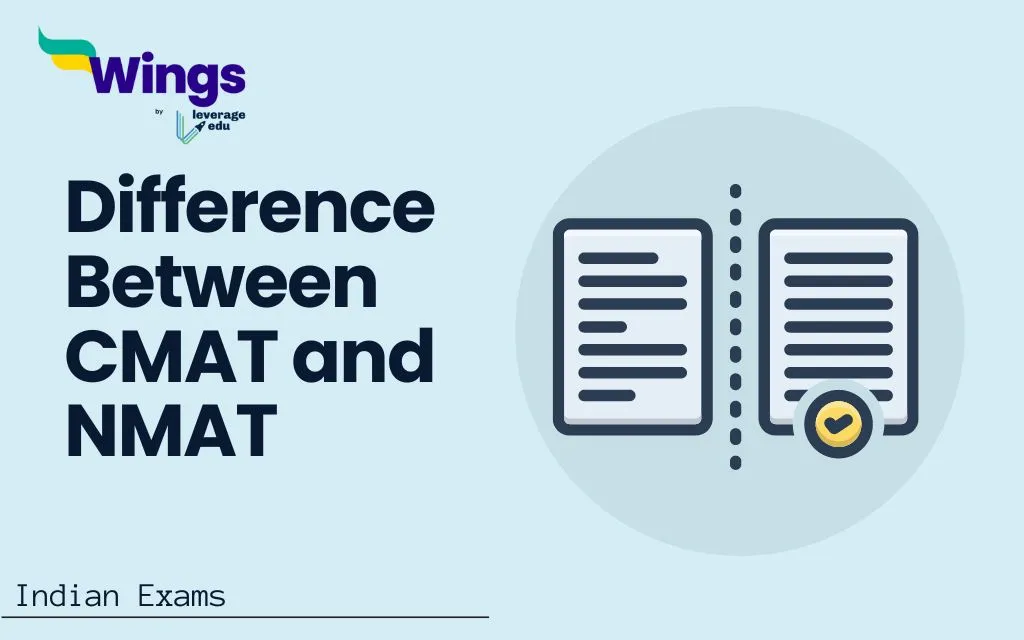The Common Management Admission Test (CMAT) and the Narsee Monjee Management Aptitude Test (NMAT) are prominent entrance exams for MBA programs in India. CMAT, conducted by the National Testing Agency (NTA), assesses candidates on quantitative techniques, logical reasoning, language comprehension, and general awareness. NMAT, on the other hand, tests language skills, quantitative skills, and logical reasoning. Both exams offer candidates the opportunity to gain admission to top business schools in India. To learn about the differences between the two, continue reading the blog post below.
Contents
NMAT Notification 2024: Latest Updates, Registration Process (Live Link), Exam Scheduling
Difference Between CMAT and NMAT: Overview
CMAT (Common Management Admission Test) and NMAT (NMIMS Management Aptitude Test) are both entrance exams for management programs in India. Here are the key differences between them:
| Particulars | CMAT | NMAT |
| Conducting Body | National Testing Agency (NTA) | Graduate Management Admission Council (GMAC) |
| Purpose | Admission to various management programs across AICTE-approved institutions | Admission to MBA/PGDM programs at NMIMS University and other top B-Schools in India and abroad. |
| Frequency | Once a year | Multiple times a year (generally within a 75-day testing window) |
| Exam Duration | 3 hours | 2 hours |
| Exam Syllabus | Quantitative Techniques & Data Interpretation, Logical Reasoning, Language Comprehension, General Awareness | Language Skills, Quantitative Skills, Logical Reasoning |
| Total Marks | 400 | Each section is scored separately |
| Official Website | https://cmat.nta.nic.in/ | https://nmat.nmims.edu/ |
Also Read: What is the Difference Between NMAT and GMAT Exam?
Difference Between CMAT and NMAT: Exam Pattern
The exam pattern is prescribed by the exam conducting body. Both CMAT and NMAT are held at different exam centres in India. To know more about the CMAT and NMAT exam pattern, refer to the table given below:
| Particulars | CMAT | NMAT |
| Mode of Exam | Online (Computer-based test) | Online (Computer-based test) |
| Duration of Exam | 3 hours | 2 hours |
| Total Marks | 400 | Scores are scaled between 12-120 for each section, with a total score range of 36-360 |
| Type of Question | Multiple Choice Questions (MCQs) | Multiple Choice Questions (MCQs) |
| Sections | Quantitative Techniques and Data Interpretation, Logical Reasoning, Language Comprehension, General Awareness, Innovation and Entrepreneurship (optional) | Language Skills, Quantitative Skills, Logical Reasoning |
| Number of Questions | 100 | 108 |
| Negative Marking | No negative marking | No negative marking |
Also Read: GMAT vs CMAT: Here’s All You Need to Know
Difference Between CMAT and NMAT: Exam Syllabus
The syllabus for CMAT and NMAT covers a range of topics under different sections. Here’s a detailed comparison of the syllabus for each exam:
CMAT Syllabus
While evaluating the difference between CMAT and NMAT, we have enlisted the topics covered under different sections of the CMAT syllabus.
Quantitative Techniques and Data Interpretation:
- Arithmetic: Percentages, Profit and Loss, Interest (Simple and Compound), Time, Speed, Distance, Time and Work
- Algebra: Equations, Inequalities
- Geometry: Lines, Angles, Triangles, Circles, Mensuration
- Modern Math: Permutations and Combinations, Probability
- Data Interpretation: Tables, Pie Charts, Bar Graphs, Line Graphs
Logical Reasoning:
- Analytical Reasoning: Statements and Assumptions, Statements and Conclusions, Statements and Arguments
- Puzzles: Seating Arrangement, Blood Relations, Series, Directions, Grouping and Conditionality
- Non-Verbal Reasoning: Analogy, Classification, Series
Language Comprehension:
- Reading Comprehension: Passages with questions
- Vocabulary: Synonyms, Antonyms, Idioms, and Phrases
- Grammar: Sentence Correction, Fill in the Blanks, Error Detection
- Verbal Ability: Para Jumbles, Sentence Completion
General Awareness:
- Current Affairs: National and International Events
- Static GK: History, Geography, Polity, Economy, Sports, Books and Authors, Science and Technology
Innovation and Entrepreneurship (Optional):
- Concepts of Innovation
- Business Strategies
- Entrepreneurship Development
- Role of Government in Promoting Entrepreneurship
NMAT Syllabus
This section includes the list of topics covered as a part of the NMAT syllabus.
Language Skills:
- Reading Comprehension: Passages with questions
- Grammar: Error Identification, Sentence Correction
- Vocabulary: Synonyms, Antonyms, Cloze Test, Fill in the Blanks
- Verbal Ability: Para Jumbles, Sentence Completion, Analogies
Quantitative Skills:
- Arithmetic: Percentages, Profit and Loss, Time, Speed, Distance, Time and Work
- Algebra: Equations, Inequalities, Logarithms
- Geometry and Mensuration: Lines, Angles, Triangles, Circles
- Modern Math: Permutations and Combinations, Probability, Set Theory
- Data Interpretation: Tables, Pie Charts, Bar Graphs, Line Graphs, Caselets
Logical Reasoning:
- Analytical Reasoning: Statements and Assumptions, Statements and Conclusions, Statements and Arguments
- Puzzles: Seating Arrangement, Blood Relations, Series, Directions, Grouping and Conditionality
- Critical Reasoning: Strengthening and Weakening Arguments, Assumptions, Inferences
Related Reads on Management Exams
FAQs
The national entrance exam for MBA admissions at NMIMS University and other reputable B-Schools in India and overseas is known as NMAT, or NMAT by GMAC.
The majority of candidates who prepare for the CAT can attempt NMAT with ease because it is much easier than CAT. So, NMAT shouldn’t be a problem if you prepare properly for the CAT. Most topics are likewise the same for both exams, except for a few minor ones.
CMAT is considered to be one of the top MBA entrance exams conducted in India after CAT. Over 1,300 B-Schools accept CMAT scores for admission to MBA/PGDM programmes.
This was all about “ Difference Between CMAT and NMAT “. For more informative blogs, check out our Management Exams Section, or you can learn more about us by visiting our Indian exams page of Leverage Edu.


 One app for all your study abroad needs
One app for all your study abroad needs












 60,000+ students trusted us with their dreams. Take the first step today!
60,000+ students trusted us with their dreams. Take the first step today!